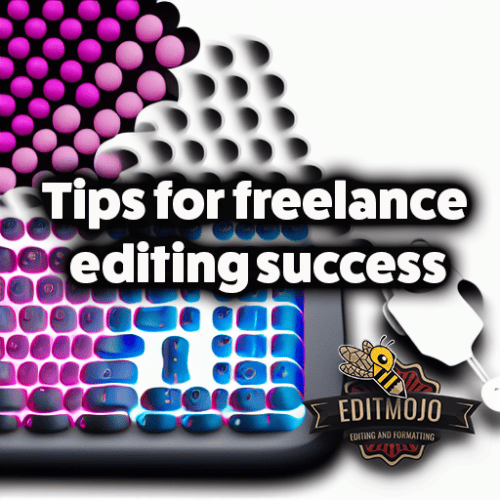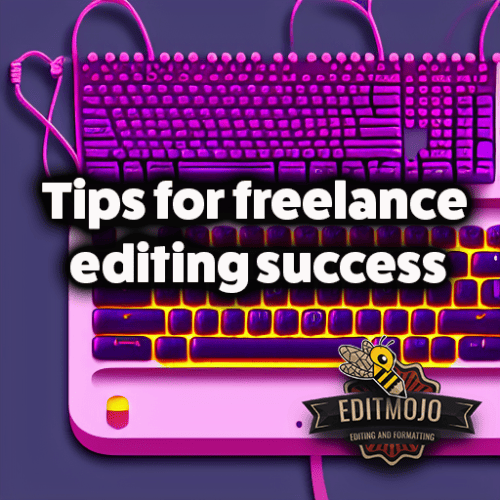Tips for freelance editing success
Tips for freelance editing success. Have you ever noticed the allure of a well-edited piece of writing, where each word is perfectly in place and the message comes through with crystal clarity? That’s the magic a skilled editor weaves. In today’s digital era, freelance editing has taken on a unique importance. With everyone from authors to businesses needing high-quality content, skilled editors are in great demand. Let’s embark on an exploration of freelance editing, shall we?
Understanding Freelance Editing
Freelance editing is all about refining and polishing content. From ensuring grammatical accuracy to maintaining consistent tone and style, freelance editors play a critical role in shaping the written word. There are four main types of freelance editing: Developmental, Substantive, Copyediting, and Proofreading, each with its unique set of tasks.
Imagine freelance editing as a multi-layered cake, where each layer represents a stage of editing. Developmental editing forms the base layer, focused on the structure and concept of the work. Substantive editing is the next, addressing the flow and coherence of content. Copyediting is all about grammar, style, and accuracy, while proofreading is the final icing on the cake, catching the last typos and errors before the content reaches the audience.

Freelance editors serve a wide spectrum of clients, including publishing houses, businesses, individual authors, academics – the list goes on. As Mark Twain once quipped, “The difference between the right word and the almost right word is the difference between lightning and the lightning bug.” This profound understanding of words and their impact sets freelance editors apart.
Building a Solid Foundation
If you’re aspiring to step into the world of freelance editing, it’s not just about being a grammar wizard. Yes, language proficiency is crucial, but so is a detail-oriented approach and familiarity with style guides like the AP Stylebook or the Chicago Manual of Style. Critical thinking skills are the cherries on top, allowing you to see beyond the words and grasp the essence of the content.
As for education, while having a degree in English or journalism can be beneficial, it’s not mandatory. Many successful freelance editors come from diverse educational backgrounds. The key is continuous learning and staying updated with language trends and industry standards. Furthermore, building an editing portfolio is an absolute must. Show potential clients your magic with before and after examples of your work.
There are numerous courses and certifications available, such as the EFA’s courses or the University of California San Diego’s Copyediting Program, that can enhance your credibility in the field.
Setting Up Your Freelance Editing Business
Stepping into freelance editing is like setting up your own business. Legal considerations, like registering your business and understanding tax obligations, are important first steps. Next, choosing your niche is like selecting the right location for your store. Be it academic papers, fantasy novels, or business blogs, focusing on what you love and know best can set you apart in a crowded marketplace.
When it comes to setting your rates, consider factors such as the complexity of the work, turnaround time, and market standards. This is an area where many freelancers struggle – remember, your skills are valuable, so don’t undervalue your work.
Marketing your services is just as crucial as honing your editing skills. A professional and compelling website can serve as your digital storefront, showcasing your skills, portfolio, and testimonials from happy clients. Remember, you’re selling more than just editing services – you’re selling reliability, attention to detail, and a seamless experience.

Networking and Client Relationships
Finding clients is often the most challenging part of the freelance journey. Platforms like Upwork and Freelancer can be good starting points, but don’t limit yourself. Explore author forums, academic communities, and local businesses.
Crafting effective proposals and pitches can open doors to new opportunities. It’s all about understanding the client’s needs and communicating how your services can meet those needs. Building long-term client relationships hinges on open communication, meeting deadlines, and delivering quality work.
Increasing Your Visibility
In the freelance world, you’re not just an editor, you’re a brand. A strong personal brand can significantly boost your visibility. Use social media platforms, SEO, and blogging to reach a wider audience. Join associations like the Editorial Freelancers Association or the American Society of Journalists and Authors to network with other professionals.
Productivity and Organization
As a freelancer, you are your own boss. While this brings great flexibility, it also requires discipline and organization. Balance your work schedule to avoid overworking. Tools like Grammarly or Hemmingway Editor can enhance your productivity. Also, remember to take breaks and avoid burnout. Your mental health is just as important as your work.
Financial Management
Freelance editors, like all self-employed professionals, must manage their own finances. It’s important to understand your worth and set a sustainable pricing structure. Plan for financial uncertainties by saving for retirement and maintaining an emergency fund. Get familiar with tax rules for freelancers – tools like QuickBooks can help manage your finances.
Overcoming Challenges
Freelancing is not always sunshine and rainbows. You might face challenges like loneliness, irregular income, and tough client negotiations. But remember, every challenge is an opportunity for growth. Look for support from peers, mentors, and online communities, and adapt to evolving market trends and technologies.

Case Studies
One of the best ways to understand the ins and outs of freelance editing is through case studies. Take Louise Harnby, a successful proofreader and editor who built a thriving business from scratch. She faced numerous challenges, like the uncertainty of income and finding the right clients. But through consistent marketing, excellent service, and a clear focus, she built a brand that is now a benchmark in the industry. Her story is a testament to the possibilities in the world of freelance editing.
Conclusion (Tips for freelance editing success)
The journey of a freelance editor is both challenging and rewarding. With the right blend of skills, marketing, networking, and financial management, you can build a successful career in freelance editing. It’s time to unleash your potential and step into the world of words and punctuation. Remember, every edit you make shapes a story, conveys a message, and impacts a reader. So pick up that red pen and start creating magic!
Resources (Tips for freelance editing success)
- Books: “The Subversive Copy Editor” by Carol Fisher Saller, “Editing Fact and Fiction” by Leslie T. Sharpe and Irene Gunther.
- Platforms: [Reedsy], Scribendi, Upwork
- Tools: ProWritingAid, AutoCrit
Top Five Questions and Answers Table
| Questions | Answers |
|---|---|
| What are the main types of freelance editing? | The main types are developmental, substantive, copyediting, and proofreading. Each has unique tasks, ranging from assessing structure and concept to correcting grammatical errors. |
| What are some essential skills for freelance editing? | Essential skills include language proficiency, a detail-oriented approach, familiarity with style guides, and critical thinking. Continuous learning and staying updated with industry standards are also vital. |
| How do I find clients as a freelance editor? | Clients can be found through platforms like Upwork and Freelancer, as well as through networking in author forums, academic communities, and local businesses. It’s also important to build a strong online presence through a professional website and social media. |
| How do I handle the financial aspect of freelance editing? | Understanding your worth and setting a sustainable pricing structure is the first step. It’s also important to plan for financial uncertainties by maintaining an emergency fund and saving for retirement. Understanding tax rules for freelancers is also critical. Tools like QuickBooks can help manage finances. |
| What are some challenges in freelance editing and how can I overcome them? | Common challenges include loneliness, irregular income, and difficult client negotiations. Building a strong network can provide emotional and professional support. Staying adaptable to market trends and changes can also help. Case studies of successful freelance editors can provide insights and strategies for overcoming these challenges. |
